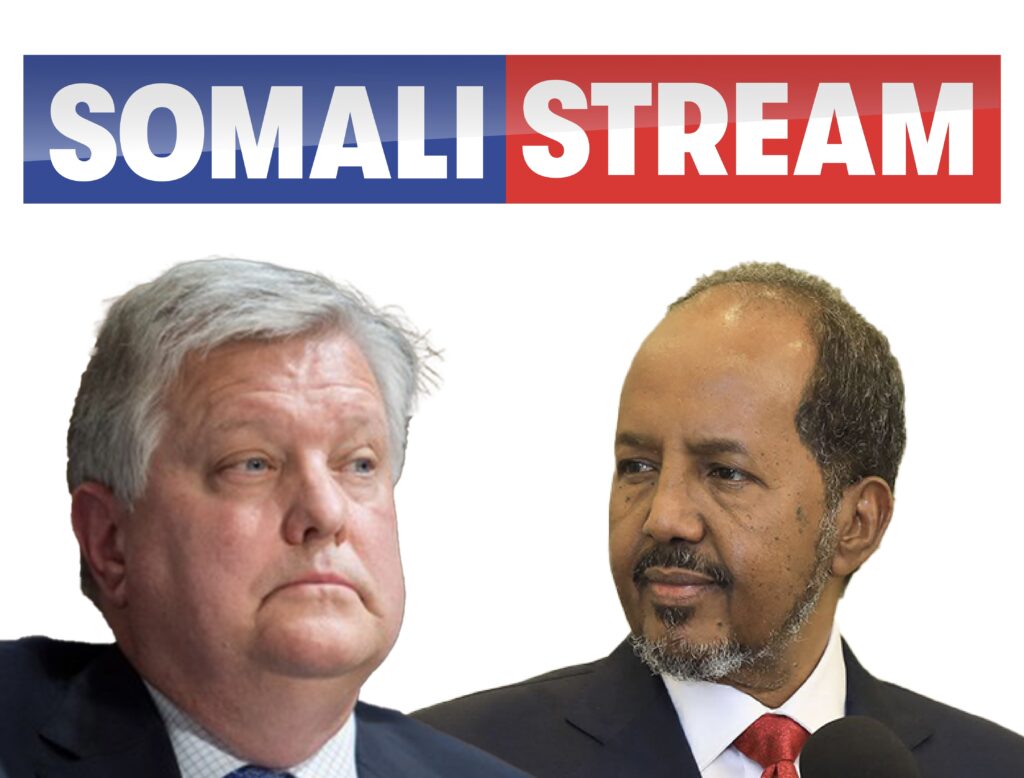Somali President Hassan Sheikh Mohamud, facing increasing domestic and international pressure to unify a fractured nation and end the prolonged conflict with Al-Shabaab, is taking a bold—and controversial—step with a new plan for national consultation talks. As Somali Stream reports exclusively, the president recently shared his vision behind closed doors with U.S. Ambassador Richard H. Riley, proposing a two-stage strategy that could either bring Somali leaders closer together or further deepen divisions in a country on the brink.
According to sources familiar with the meeting, President Mohamud emphasized that the first phase of the talks would be open to all politicians in Somalia. “Anyone who wants to come should come,” he reportedly told the ambassador. The president envisions these discussions being broadcast live on national television to ensure transparency and inclusiveness.
This phase will focus exclusively on strategies to defeat Al-Shabaab, the militant group responsible for a series of deadly attacks across Somalia, including in the capital, Mogadishu, as well as Hirshabelle, Southwest, Galmudug, and parts of Jubaland. The goal is to forge a consensus on a unified security strategy—free from the contentious debates surrounding elections or constitutional reform.
Phase Two: Deni Yes, Madoobe No
President Mohamud wants the second stage to be restricted to top officials: leaders of the Federal Government and Federal Member States. He argues that these individuals hold the political power and constitutional mandates necessary to make binding decisions regarding Somalia’s future.
Furthermore, the presidency is resolute. “This is not a reunion. It’s a governing conversation,” explained an insider from Villa Somalia. “Only those with real power and responsibility will be allowed to make binding decisions.”
The Villa Somalia appears uninterested in including opposition politicians, traditional elders, or civil society representatives in these closed-door negotiations.
He has expressed a willingness to engage directly with Puntland’s President Said Abdullahi Deni, with whom he has clashed over constitutional reform and elections. However, he has ruled out any participation for Jubaland’s President Ahmed Mohamed Islam “Madobe,” whom he allegedly dismisses as illegitimate.
This exclusion has generated confusion and criticism, both domestically and internationally. Critics question who gets to decide who is a “legitimate” leader in Somalia’s intricate federal system. Given that the legitimacy of various regional leaders is often contested, some argue that only a genuinely inclusive process can prevent another political standoff.
American Pressure and Fragile Ground
The U.S.—a key ally in Somalia’s fight against Al-Shabaab and its state-building efforts—has reportedly voiced concerns. Ambassador Riley is said to have urged President Mohamud to reconsider his approach, warning that a selective process could exacerbate divisions at a time when unity is paramount.
Somalia stands at a crossroads. Federal elections were conducted in 2022 after over a year of protracted delays and disputes. Yet, the political environment remains tense. A proposed package of constitutional amendments recently passed by the cabinet and parliament has been rejected by Puntland and other opposition groups, who argue it undermines the federal system and centralizes power in Mogadishu.
Meanwhile, the Somali National Army, supported by local militias known as Ma’wisleey and international partners, is engaged in a crucial military offensive in Hirshabelle and Galmudug states. Although the government claims to have gained ground, Al-Shabaab continues to be resilient, capitalizing on political disunity to regroup and strike.
The Clock is Ticking
At the start of the year, the mandate for the African Union Stabilization Support Mission in Somalia (AUSSOM) was renewed after the ATMIS mandate ended, increasing the pressure on Somali leaders to establish stability in their country. President Mohamud has framed his proposed discussions as a pathway to national salvation; however, if not handled properly, they could turn into yet another squandered opportunity.
The coming weeks will test whether Somalia’s political elite can overcome rivalries and unite for the sake of peace. Yet, as one diplomat remarked, “This country doesn’t need more exclusive meetings; it needs inclusive solutions.”


